How to combat quarantine boredom
Online entertainment resources
BY GISELLE ORMENO
The daily routines of many people in Los Angeles have come to a stop because of COVID-19, but that doesn't mean people still can’t have fun.
While people are home following the rules of quarantine, they can stay connected online.
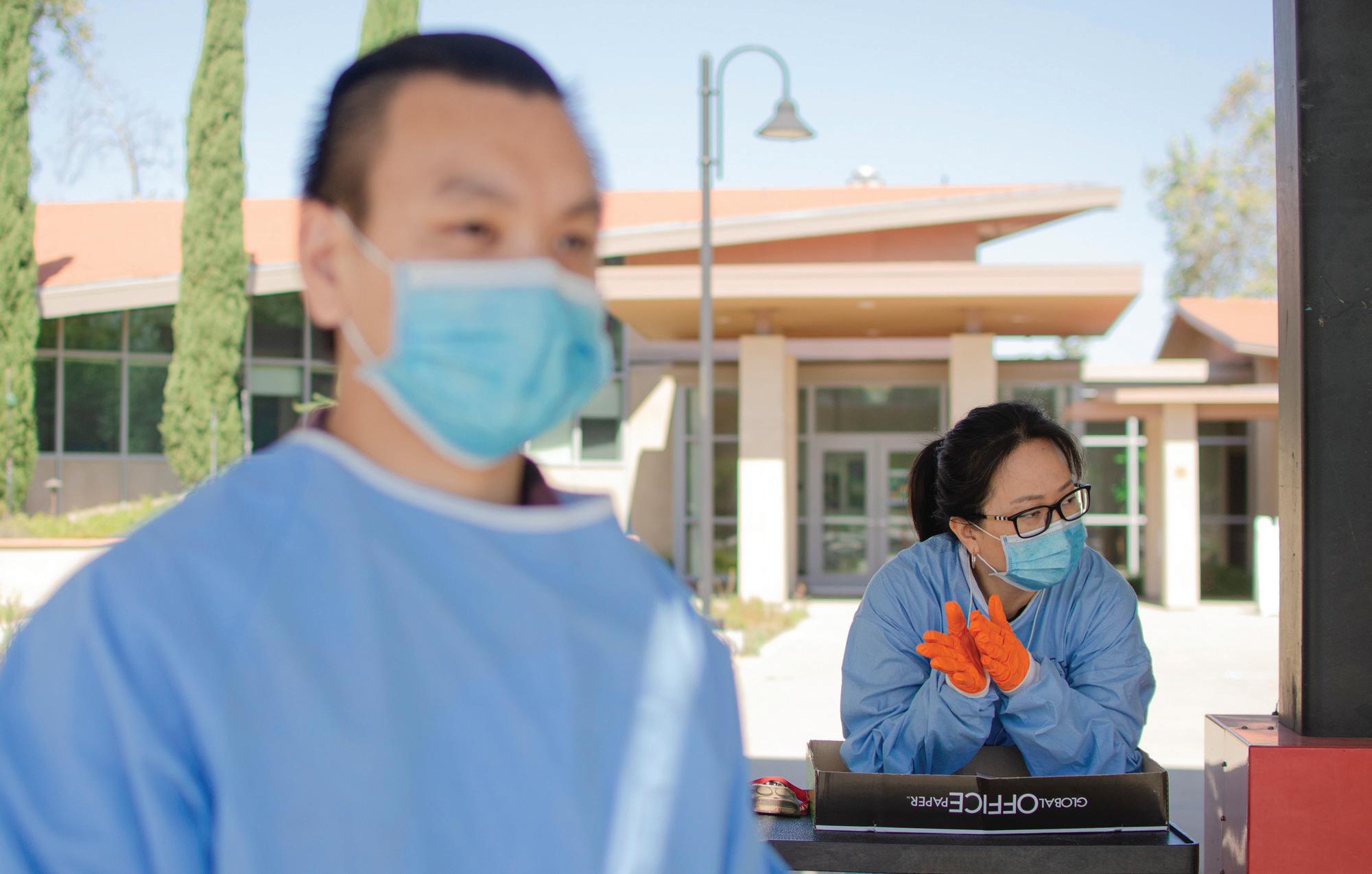
Social media apps, including Houseparty, have become the new ways for family members and friends to reunite and hang out.
Houseparty
In Houseparty’s latest update, CEO and co-founder Sima Sistani stated that Houseparty had become the normal routine for everyone in the past few weeks.
Former PACE Director dies
Found success through education and encouraged others to do the same
BY ALEJANDRA AGUILERA
Arthur Gillis, former director of the Program for Accelerated College Education (PACE) at Pierce and an advocate for adult learners pursuing higher education, died from a long-term illness on March 21. He was 73.
Linda Gillis, his wife of 53 years, said in a phone interview that Arthur Gillis came from a poor family. He viewed education as a ticket out of that economic state and later became the first person in his family to attend college.
“He touched many students personally because he did come from a background that was very similar to a lot of students that he taught,”
Linda Gillis said. “He realized that he could get out from under with education and he really encouraged people to get their degree because it’s something that couldn’t be taken away from them.”
Arthur Gillis, who also went by Art, grew up in the same Chicagoan neighborhood as his wife Linda Gillis. The pair began to date when they were both teenagers.
By the time they got married, he earned a bachelor’s degree in business administration from Roosevelt University in Chicago, Illinois in 1970.
He then became a certified public accountant through the University of Illinois at Urbana-Champaign in 1972 and later worked at the Bansley and Kiener firm as Senior Accountant.
The husband and wife eventually moved to California along with their two sons, Joshua and Brian, in 1977.
After a series of business administration and accounting jobs, Art Gillis experienced life as an adult learner first-hand while continuing his higher education. He earned a master’s in taxation in 1999 at Golden Gate University, followed by a doctorate in education at Nova Southeastern University in 2002.

He then began teaching business courses at DeVry University and at California Lutheran University, even while working at Pierce.
“There was nothing he cared for more than his family, and next were the students,” Linda Gillis said. “He really took them under his wing.”
According to an article published by the Roundup in October of 2004, Art Gillis was named the new PACE Program Director at Pierce that same year.
Lupita Narkevicius, Senior Office Assistant of the program, said in a phone interview that she’s known Art Gillis since they became colleagues in 2006.
“He was always the driving force behind the PACE program,” Narkevicius said. “He had a real passion for making sure that our
population of working adults got a chance to get the same education as any other students.”
When Narkevicius first got hired, she had associate’s degrees in computer technology, business communication and liberal arts.
But after bonding over being Type A people and sharing a dry sense of humor, Art encouraged Narkevicius to pursue a bachelor’s and master’s degree.
“He was just one of those people that really, really believed in higher education,” Narkevicius said. “I'd always wanted to do it, but with work and everything, it's really hard to balance a work life, personal life and pursuing an advanced education.”
Art accommodated Narkevicius’ work hours while she juggled being a full-time employee at the PACE program and a full-time college student beginning in 2009.
After a couple years of dedication, Narkevicius earned a bachelor’s degree in business management from Pepperdine University and later a master’s degree in business administration from the same college in 2013.
Dean of Academic Affairs Mary Anne Gavarra-Oh said in a phone interview that she met Art Gillis in 2012, and later oversaw the PACE program. She said Art Gillis helped expand the program by creating different branches in Norwalk and in downtown Los Angeles.
“He believed in the working suit, our adult students,” GavarraOh said. “He was always working through the departments and looking for the best instructors that would benefit his program.”
PACE Director Joleen VossRodriguez said in a statement via email, that Gillis was a caring colleague and campus leader. Even after retiring in 2017, she said he made himself available to answer questions regarding the program.
“His dedication to the growth of the PACE program and support of the PACE students remained strong,” Voss-Rodriguez said. “We adored Art and are deeply saddened by his loss.”
Once retired, Art Gillis became an adjunct professor and continued teaching business courses at Pierce and at DeVry University.
Linda Gillis recollects how in April of last year, Art Gillis had to cancel a class since he was being hospitalized.
While in the hospital room, two students in that particular class walked in to visit their professor and hugged both Linda and Art Gillis. Then the pupils gave him an orchid plant and a card as “Get well soon” momentos.
“In the card they wrote something that [Art] was so influential in continuing their education,” Linda Gillis said. “It was quite touching.”
that they will let students K-12 and college students use their services free for three months.
Babbel stated in their company blog that while nothing can replace the environment of being in a live language classroom, they have created courses made by native language speakers and language teachers. The purpose of these courses is to improve reading, writing, speaking and listening skills.
"As a learning company, we figured the best way we could help our community right now is to open up our entire stash of online language learning content to students who are looking for some continuity (or just a way to stay busy) while they're stuck at home," Babbel said on their blog.
“We’re humbled to bring people together during this unprecedented time for everyone around the world,” said Sima Sistani said in a statementin a blog post. “As we physically distance ourselves for the common good, online human connections are more important than ever before. It’s a challenging time, but we are committed to ensuring the best possible experience for our customers, fans, and supporters.”
Netflix Party
Netflix is partnering with Google Chrome so that groups of people can stream and chat about series or movies together, at the same time, without having to be in the same room. The Netflix and Google Chrome extension synchronizes video playback and adds group chats for friendly commentary.
National Historical Museums
Visit the National Historical Museums of LA County Virtually

Even though the National Historical Museums (NHM) of LA County are closed, the museum is uploading videos onto their website for the public to explore exhibits. They are inviting people to learn about natural and cultural wonders safely from the comfort of their homes.
This month the NHM is putting the spotlight on Earth.
The latest entry is about the discovery of the smallest dinosaur to date named Oculudentavis, or eye-tooth-bird, for its strange features of having large eyes and many teeth. The dinosaur's body is preserved in 99-million-year-old amber from Myanmar.
Babbel
Learn a new language for free through Babbel.
Babbel, a subscription-based language learning app and online learning platform, has announced
Raisa Esmeral's experience
Here’s how one Pierce College Student is dealing with her boredom Raisa Esmeral, a Kinesiology major, said through email correspondence that going through the COVID-19 pandemic has made her focus on personal art.
"Being the type of person I am when bored, I feel I have to do something creative with my time and energy,” Esmeral said. “It helps a lot, and I personally think it heals us mentally as well."
Esmeral is currently using art programs on her computer such as Clip Art Studio and Photoshop to pass the time. On Adobe's website, there is a list of helpful sources they provide to help people stay creative and productive during the crisis.
Adobe has also recently announced that students K-12 and higher education institutions will provide Creative Cloud access to students through on-campus labs.
Esmeral occupying her time with digital art and also learning how to crochet. Crochet is the process of creating textiles by using a crochet hook to interlock loops of yarn, thread or strands of other materials. Esmeral already has a Harry Potter crochet kit ready to go, that was a gift from her sister.
Like any other person stuck at home, she is also streaming shows and movies online through streaming platforms such as Netflix and Crunchyroll to cope with the COVID-19 pandemic. She has been streaming the latest popular documentary "Tiger King," on Netflix, and the anime "My Hero Academia" on Crunchyroll.
"Art in media like shows and animations helps me out too, it can be fun to find a new show or movie," Esmeral said.
A FIRST AMENDMENT PUBLICATION www.theroundupnews.com ROUNDUP Woodland Hills, California One copy free, each additional copy $1.00 Wednesday, April 8, 2020 Volume 132 - Issue 5
Arthur Gillis is survived by his wife Linda, their three sons Joshua, Brian and Daniel and their grandchildren.
Kevin Lendio / Roundup
(Right to left) Arthur Yin, senior secratary, and Susan Rhi-Kleinert, dean of Academic Affairs, wait to distribute laptops provided by the Los Angeles Community College District for staff and professors of Pierce College in Woodland Hills, Calif., on April 3, 2020.
Photo courtesy of Lupita Narkevicius. Arthur Gillis poses with his award of recognition from the Los Angeles Unified School District Personnel Commission, on April 16, 2008.
Katya Castillo / Roundup
gormeno.roundupnews@gmail.com
Deputy Carlos Gonzalez checks in visitors at the Winnetka entrance at Pierce College in Woodland Hills, Calif., on April 3, 2020.
aaguilera.roundupnews@gmail.com
"There was nothing he cared for more than his family, and next were the students."
-Linda Gillis
For more information about laptop distribution for faculty, see page 3.
From the desk of the Roundup: Editorial

Calling for a tuition discount
Pro: Staying open to help those in need
BY SHEHREEN KARIM
COLUMN:
Illustration by: Kevin Lendio
 T
wo more months and the spring semester will be over. For students of Pierce College, these months are painful days of facing unprecedented challenges brought by the global disruption of COVID-19.
T
wo more months and the spring semester will be over. For students of Pierce College, these months are painful days of facing unprecedented challenges brought by the global disruption of COVID-19.
In an online article by CNBC, California Gov. Gavin Newsom said as of March 13, the unemployment claims in the state had passed the 1 million mark in less than two weeks, as businesses continue to close and urge their workers to stay home in wake of the coronavirus spread.
While everyone is busy taking care of the sick and dying, the raising numbers of low-income families and students affected were left financially ill.
Given the rise of economic concerns, Los Angeles Community College District should examine this situation and consider reducing the school fees as a way to effectively assist the needs of the student body.
Before the pandemic, a Fall 2018 survey conducted by LACCD shows that 63% of the students already considered the lack of finances as a stumbling factor to their academic success.

About 65% came from a household that makes a total annual income of less than $34,000. Almost half of this percentage makes $14,000 and below.
Pierce College estimated a $7,448 cost for a California student to attend full-time in one academic year.

How can a family who makes $14,000 afford to pay a rent, provide for their food and send a child to college?
It’s difficult to imagine how they would be able to survive through these trying times with very minimal funds, let alone having a family member who’s been unemployed for more than a month.
Since the closure of the Pierce College campus, many of the facilities and offices have been mandatorily abandoned.
What came along with this is the unemployment of the student workers who depend on their oncampus jobs to pay for school fees.
This also greatly impacted the international students who have limited job opportunities outside the school and pay $297 per unit–six times the amount California students pay.
One of the big issues is financial insecurity.These closures cost students their opportunity to gain income and added more expenses on their end.
Some students were dependent on the free food and child care provided by these institutions, but now they are strained to look for other resources that mostly would require them to take more money out of their tight budget.

On March 30, Pierce College resumed its classes online.
This transition has potentially lowered down expenses for the college including electricity, maintenance, parking, health care operations, transportation, paychecks and many more.
Saving money and still collecting a full amount from impoverished students is seemingly unforgiving.
When the spring semester started, on-campus students enrolled with an expectation of an in-person learning environment.
Students are forced to change their lifestyles and look for access to computers, books, internet and other essential resources that the campus facilities would have provided.
These are some of the major issues that students face while continuing their studies at home.
Change.org reported 16,281 students from Oregon State University have signed a petition to reduce their tuition cost for this semester after the relocation of their classes to online.
Student Jessica Etter commented, “I shouldn’t pay full tuition for less than full education.”

From what the students of Pierce College are getting from these circumstances, it would make more sense to adjust the numbers and lessen their burden than keep up with the quality of learning that’s already been deprived.
newsroom.roundupnews@gmail.com
s COVID-19 spreads, only essential businesses such as restaurants remain open and limit their business to take out and delivery to provide services for those unable to go grocery shopping.
A
According to Dr. Eric CioePena, the director of global health for Northwell Health, restaurants are essential to the public because many health care workers may rely on restaurants to provide food as they work in hospitals unable to go out and get weekly groceries.
The role of restaurants is crucial during these times because if restaurants were to close, it would cause even more panic and longer lines at grocery stores.
According to Kerry Bowman, professor of bioethics and global health at University of Toronto, having restaurants stay open helps alleviate anxiety for people fearing a food shortage thus reducing the panic at grocery stores.
As a precaution to reduce the fear of spreading COVID-19, delivery companies such as Grubhub and UberEats created a “no-contact delivery” service in order to ease fears and keep customers and workers safe.
As businesses close, people question why restaurants are deemed “essential” and wonder if they would cause the virus to continue spreading by remaining open.CNBC reported that Starbucks now requires baristas to wash their hands every 30 minutes and no longer accepts reusable cups.
While fast food chains can survive the pandemic, restaurant analysts such as The National Restaurant Association estimates that 75% of small businesses who are closed during the pandemic will not make it which would lead to over five to seven million employees unemployed.
During this pandemic, family owned restaurants struggle to get orders from customers through take out or delivery. As orders for restaurants decrease, this causes layoff for waiters and waitresses causing more unemployment.
The L.A Times reported that taqueros are especially struggling during this time. For many families, this is their sole source of income. While it seems easy to close everything for a month and
reopen it once the pandemic has passed, the damage won't impact fast food chains as much as it will to local businesses.
Money spent on local business directly supports the family who owns them which is crucial during this time. The Washington Post reports how people are supporting local business through purchasing their gift cards as a way to keep them afloat.
As families stay home, local restaurants take an essential role in reducing the anxiety involved with food shortages and feeding those who are unable to go grocery shopping.
Money spent on local business directly supports the family who owns them which is crucial during this time. The Washington Post reports how people are supporting local business through purchasing their gift cards as a way to keep them afloat.
As families stay home, local restaurants take an essential role in reducing the anxiety involved with food shortages and feeding those who are unable to go grocery shopping.
BY ARIELLE ZOLEZZI
BY ALEJANDRA AGUILERA
To flatten the curve of COVID-19 and give hospitals a chance to not overcrowd with cases, restaurants should close and not offer takeout or delivery services.
The World Health Organization (WHO) announced COVID-19 is mainly transmitted through contact with respiratory droplets, which can remain on surfaces for a period of time.
According to an article published by the National Institutes of Health (NIH) on March 17, scientists from NIH, the Centers for Disease Control
Photographers:
and Prevention, UCLA and Princeton University researched the longevity coronavirus 2 lasts on surfaces.
The report detects that liquid or solid droplets, known as aerosols, can remain on cardboard surfaces for up to 24 hours and on plastic for up to two to three days.
If a person orders pizza for takeout or delivery, there is a risk of possible infection if anyone sneezed or coughed near the delivery box. Even with a simple touch of the package, that exposure remains.
Restaurants that are currently still operating take precautionary measures, but WHO reports that cases of virus transmissions occur most in community settings. Food establishments are community settings.
By keeping restaurants open, customers and employees become endangered.
I
t seems as though every time I go to get my Coronavirus update, someone is blaming millennials for the spread of the COVD-19 virus.
But I’m calling those people out right now, because if it wasn’t for the baby boomers I don’t think we would be where we are today.
In print and online, news outlets like the New York Post display tweets from random party goers and idiotic memes about being irresponsible.
Even Donald Trump added “I see a lot of people just dismissing this thing, that this is ‘No worse than the flu, and I’m going to continue to live my life,’ especially these people the younger generations.”
Somewhere along the line millennials gained this reputation of being lazy, careless and selfobsessed; and while there is a fraction of those who do fall in that category, it is thoughtless to lump everyone in that age range into a cookie-cutter.
This is understandable because people older than 60 are at greater risk of becoming seriously ill than younger folks who don't have underlying health conditions, but I sense that the younger generations are the ones that are displeased with the way that the baby boomer generation is handling this pandemic.
If those in charge would have had a greater sense of urgency from the first warnings health officials administered, we could have expeditiously curved the infection rate.
I’m not saying that the younger generation hasn’t helped perpetuate the spread of the virus, but if you have actually been outside in the past couple weeks, most people that you see are a solid 40+ because that is the age range of the only people who can afford to be out shopping right now.
Also millennials probably wouldn’t be the ones on spring break, considering that the age group is usually defined by those who were born between 1981 and 1996, and most of the people on spring break at this point are probably going to fall into Generation Z.
On April 5, McDonald’s employees at a Los Angeles location demonstrated a walk out protest because a coworker was diagnosed with COVID-19 and management had not shared that information, according to a Newseek article. Employees also said management had not given them protective masks or gear to use while working.
In worst case scenarios, this could be happening in multiple restaurants, further risking the health of essential workers and customers.
Self quarantining isn’t an ideal situation to be in, but it’s necessary to lessen the cases of people infected with COVID-19. That’s why it’s imperative that restaurants close along with the options for takeout and delivery.
skarim.roundupnews@gmail.com aaguilera.roundupnews@gmail.com
not Advisers: Jill Connelly Jeff Favre Tracie Savage Advertising Manager: Sean Collins-Smith *For advertising call Sean at (818) 710-2960
or
Although it is clearly counterproductive to be out partying “in the name of spring break”, if you set clear concise guidelines prior to a mass breakout, there won’t be as big of an impact/ripple effect.
I personally have had to beg my grandparents to stay in the house, and I when I finally do convince my family to let me shop for them, I see all types of parents and grandparents just out and about like nothing is wrong.
Don’t you want to see us all get married or start a family? Because I would like to have all of my family members present for as long as I can stall.
2 Opinions ROUNDUP: April 8, 2020 Letters to the Editor 6201 Winnetka Ave. Woodland Hills, CA 91371 Room: Pierce College Village 8211 Phone: (818) 710-4115 Phone: (818) 710-4117 Website: www.theroundupnews.com E-mail: newsroom.roundupnews@gmail. com Editor-in-Chief ......................Katya Castillo Managing Editor ..................Angelica Lopez Photo Editor ...........................Cecilia Parada Photo Editor ............................Kevin Lendio Opinions Editor .....................Samantha Neff News Editor ............................Paola Castillo News Editor ...........................Arielle Zolezzi Features Editor ......................Peter Villafane Features Editor ....................Eduardo Garcia Campus Life Editor...................Ale Aguilera Sports Editor ..........................Felipe Gamino Sports Editor .....................Benjamin Hanson Copy Editor........................Chelsea Westman Social Media Editor ...............Isadora Gardia Social Media Editor ............Kamryn Bouyett Multimedia Editor ...................Atena Naghi Reporters: Andrea Pena Giselle Ormeno Hannah Green Joey Farriola Jonathan Eaton Joshua Bleiweiss Maya Garibay Nani Welbeck Pablo Orihuela Reza Rastegarrazi Shehreen Karim Taleen Keuroghalian Victor Bretado Elizabeth Dowell Policy: Letters and guest columns for or against any position are invited. Letters should be kept as brief as possible (300 words or less) and are subject to editing. Letters must be signed and include a valid mailing address and telephone number. Pseudonyms or initials will not be used, but names may be withheld upon request and approval of the Editorial Board. The Roundup publishes “Letters to the Editor” that are
obscene
libelous
do not contain racial denigration. Writers are given the opportunity to
letters. The Pierce College Roundup
letters,
releases,
materials
Board
letter. The
is 11:59 p.m.
Sunday
date. Editorial Policy: The Pierce College Roundup
editorials. Cartoons and photos,
The
The generational finger pointing should stop because we are in a race against time and every moment counts and you never know if you are going to be that person that contracts the virus. Adam Baron Ali Sokhansano Arsalan Rahbari Ashley Shellmire Bethany Lopez Yunes Raha Jordan Erickson Jose Samour Joshua Price Karla Avalos Marley Williams Natalie Sanchez Nathan George Yamin Rashid Race Davis
and
revise unacceptable
will not publish, as
literary endeavors, publicity
poetry or other such
as the Editorial
deems not to be a
deadline
the
prior to the issue
position is presented only in the
unless run under the editorial masthead, and columns are the opinions of the creators and not necessarily that of the Roundup.
college newspaper is published as a learning experience under the college journalism instructional program. The editorial
and advertising materials published herein, including any opinions expressed, are the responsibility of the student newspaper staff. Under appropriate state and federal court decisions, these materials are free from prior restraint by the virtue of the First Amendment to the Constitution of the United States of America. Accordingly, materials published herein, including any opinions expressed, should not be interpreted as the position of the L.A. Community College District, the college or any officer or employee thereof.
Not getting what we paid for
Who's to blame?
Whether a person has been practicing social distancing or self-quarantining, the next incoming weeks is the time to sacrifice personal wants for the greater good.
Con: Hamburgers with a side of COVID-19
Illustration by: Peter Villafane
azolezzi.roundupnews@gmail.com
Concerns about new transfer requirements
Pass and no pass grading discussed at Academic Senate
BY SHEHREEN KARIM
As COVID-19 brings physical interactions to a halt, the Pierce College Academic Senate met on a Zoom conference call April 6, with faculty raising concerns about grading and UC and CSU requirements.
Senate President Barbara Anderson addressed how students are able to now withdraw from courses by only using excused withdrawals and informs how the deadline for students to request a pass and no pass grading scale has been extended.
“For some students that's a good option, because originally it was only available for courses in the catalog, but the state chancellors and CSUs have approved even major prep and golden four can be pass/ no pass,” Anderson said.
Anderson added how students need to be mindful in eliminating a letter grade and opting for the pass and no pass scale because the UC’s still haven't released information about their new requirements or if they will have any.
As for the CSU’s, Transfer Center Director Sunday Salter explained how the CSU Chancellor’s Office will allow students to transfer with 48 units as long as they complete the rest by the end of summer. However, this change is only for Fall 2020 transfer students.
Prior to COVID-19, students needed to complete all their units and the “golden four” by their spring semester but in light of COVID-19, the CSU’s made an accommodating decision to allow students to complete their requirements by summer.
“We want to send a message to Pierce students that we are still here for you if you want to stay and complete your courses with us,” Salter said. Adding how the CSU’s are also allowing students to defer their enrollment to the Spring 2021 term.
Salter said how the UC’s are only temporarily removing the cap pass and no pass classes which means students will not be penalized for opting for credit or no credit prerequisite courses.
The difference between CSU’s and UC’s is that each UC campus will release their own new change or requirement in response to COVID-19. Salter said she is still waiting for UCLA’s requirements since most Pierce students want to transfer to UCLA.
Kinesiology professor
Sabrina Prieur raised a concern about if students opt for the pass no pass, it could hurt their chances for a school who doesn't accept pass no pass unlike UCs and CSUs.
“In the best interest of the students, a letter grade would be better unless they end up with a poor letter grade, and not to go with the pass no pass option because we don't know what all universities will accept,” Prieur said.
As a response to this concern, Sunday Salter agreed and explained how a letter grade would be a better option for those unsure of the university's requirements.
“When they have multiple options in front of them, we always have to go with the most restrictive and encourage students to go with a letter grade when we are unsure of the answer,” Salter said.
Pierce College continues to adjust to the new normal
The COVID-19 response teams give progress updates on how the campus is transitioning to online
BY PABLO ORIHUELA
The four COVID-19 response teams discussed campuswide sanitation and student accessibility toward student services in an online Zoom meeting April 1.
Vice President of Administrative Services Rolf Schleicher took a moment to focus on some of the district and college news at large.
“It was just announced today that Kroger, Ralphs and Food 4 Less, are donating $150,000 worth of gift cards to our students,” Schleicher said.
“Each student will be eligible for a $50 giftcard. Everything helps and hopefully those will go out within a short time frame.”
Schleicher mentioned that 8,000 students in the Los Angeles Community College District have put in requests through the District scholarship to receive laptops.
According to Mark Henderson, Valley College received 31 Lenovo laptops and Pierce received 15.
“Everyday we’re asking for more equipment,” Schleicher said. “I want to make sure we’re getting as many as the other colleges. I know the district is pushing hard to not only get more cleaning equipment, but also more access equipment.”
Director of the Student Health Center Beth Benne began Team A’s update by expressing the difficulties the Student Health Center has been having while transitioning towards online consultations with students.
“We are really struggling with all kinds of issues providing medical and mental health services,” Benne said.
“Some of the data we’re trying to gather [from students], whether it be
consents, an intake form for mental health counseling or health history for a medical consultation, we don’t know where these documents are going to live.”
Benne offered up a solution to use the student portals that the Health Center’s medical systems use.
“Everything we do online has to get put into our medical records,” Benne said. “I believe the student portal is the bridge to that, but I don’t know how to go about doing that.”
Operations Manager Rodney Allen said that buildings continue to be disinfected about two to three times a day and that all custodians will receive training online.
“We have one that’s set up through the District with American First Responders and it’s through the National Safety Council for Blood Borne and Airborne Pathogens,” Allen said. Pierce College Deputy Nick Saldivar said despite putting up snow fencing around pedestrian entrances and driveways with a sign that says access to campus is restricted, the deputies are having a difficult time keeping people off campus.
Saldivar said people have even cut the fence to get on campus and that it now needs to be repaired.
“We still have people ignoring the signs,” Saldivar said. “This weekend, we saw around 50 people attempting
to come on campus, and we just discouraged them. As this continues, we anticipate it being harder to keep people off.”
Associate Vice President Bruce Rosky from Team B said the campus mailroom operations may change in an effort to practice social distancing and limit faceto-face contact. He proposed giving departments scheduled time frames for picking up and dropping off mail.
Vice President of Academic Affairs Sheri Berger from Team C said there are 450 Canvas courses shells with embedded tutors and a general shell for each discipline.
To be added into the general discipline shells, instructors can add students through their student I.D. number or email address. Students can also go into the Center for Academic Success (CAS) website to enroll into these tutoring shells.
Tutoring through NetTutor is also available 24/7 for students.
Berger also announced that a Summer Bridge Program task force will be created to plan for the next class of incoming first-year students.
“The intention is to help students transition into college and the current model was created for a face-to-face setting,” Berger said. “We need to rethink what that will look like in an online model to help students transition from high school into college if we're going to be online during the summer.”
Dean of Student Engagement Juan Astorga from Team D said student services such as financial aid, admissions and counseling will be conducted through Cranium Cafe.
“That's really going to be the centerpiece for how we're going to be doing service delivery for students and getting as much consistent information as possible,” Astorga said.
Pierce College President Alexis Montevirgen concluded the meeting by saying the preparation from the COVID-19 response teams have helped resume instruction online.
“I am very pleased and very proud of how this team has come together in trying to make sure that we’re addressing as many things as possible, and that we continue to do so as things continue to come up,” Montevirgen said.
porihuela.roundupnews@gmail.com
Road to distributing refunds for students
BY MAYA GARIBAY
Los Angeles Pierce College faculty held their third meeting via Zoom on April 3 to discuss the novel coronavirus, how the college has been dealing with it so far and what should be done moving forward.

Vice President of Administrative Services Rolf Schleicher kicked off the meeting by discussing how he felt the shift to online classes has gone so far.
“We’ve done a really good job shifting over into our online environment and instruction,” Schleicher said.
President of Pierce College Alexis Montevirgin spoke afterward and shared the same position as Schleicher.
“I am very pleased and very proud of the fact of how the campus has come together during this COVID-19 situation,” Montevirgin said. “I know there are still lots of things that we are still working through. Know that we have our teams working hard and working diligently and around the clock in terms of trying to address as many of those concerns as possible.”
Student Health Center Director Beth Benne hopped on and discussed the issue of how students without residence should receive their financial aid check.
She discussed the possibility of entering a safe location, like the sheriff substation, with gloves and masks to pick up their checks. She believes this is the safest and only
way for these students to receive their checks.
Pierce College deputy Nick Saldivar spoke on how they are engaging with the public and patrolling campus during the time.
He said that most of the general public has been adhering to the stayhome policy, and those who have not have left campus when instructed.
He also discussed setting hours for faculty to visit the campus, but hours and days were not decided upon during this meeting.
“Everything is running pretty smoothly on the law enforcement aspect of it,” Saldivar said. “Our checkpoint is running well.”
Faculty also discussed the laptop scholarship which has been offered by
Pierce.
About 9,400 students in the Los Angeles Community College District have applied for the scholarship and so far, about 1,800 laptops have been given to students.
They are now discussing the possibility of mailing laptops rather than having students pick them up on campus, according to Faculty Professional Development Coordinator Fernando Oleas.
For more information about laptop distribution, see the Pierce College Council meeting story.
Vice President Schleicher stated that as of Friday, the plan with parking passes is that those who had bought a parking pass this semester and will not be returning to Pierce College next
semester, will receive a 50% refund. Students who purchased a parking pass and are returning next semester will receive a free parking pass.
Financial Aid Director Anafe Robinson confirmed that students will still receive financial aid and that the college is receiving funds to award additional grants to students in need. The school will receive an estimated $10,000 to give to students and students will receive $100-500 based upon their needs. The District frequently asked questions can be found under “COVID updates” on the Pierce website. Students are encouraged to check there before contacting faculty regarding the pandemic and how it affects the campus.
Providing basic essentials for those in need
Pierce College Council finding ways to supply students with necessary resources
BY EDUARDO GARCIA
The first COVID-19 case in the Los Angeles Community College District (LACCD) was confirmed by Pierce College President Alexis Montevirgen over a Zoom meeting with the Pierce College Council (PCC) on April 2.
The confirmed case is linked to an essential employee, Montevirgen said. Pierce has not had any direct cases related to the campus.
“Our hearts go out and our thoughts go out for the quick recovery of that employee,” Montevirgen said. “The best thing you can do is to stay at home, and that's just not for the interest of the college, but it's for the interest of everyone and for the interest of all during this crisis.”
Brahma Pantry and Basic Needs Program Lead D’arcy Corwin said she and her team are coming up with a plan to send care packages out to students who need assistance. She said her team has community partners that have been getting immediate services to the students.
“One is the college mission coalition, which has helped get Uber Eats meals to students for free as well as our Living Praise Christian church collaboration,” Corwin said.

“They also have a care package system, where I can fill out the form on behalf of the student to get those essentials sent to the students' homes.”
Corwin and her team are also developing a new program as part of the Basic Needs Program in connection to the Los Angeles Homeless Services Authority (LAHSA). She said the company has assigned a peer navigator to the campus.
“If anybody's aware of a student who is experiencing homelessness, we can connect with them,” Corwin said. “There is a space available for them where they can go and work with a housing navigator.”
LAHSA is offering students who use this resource breakfast, lunches, hygiene kits and showers.
For students who have applied for the Emergency Laptop Scholarship and have gotten accepted, Montevirgen said LACCD is distributing laptops as fast as they are received.
“There's a holdup of them distributing any Chromebooks that they currently have,” Montevirgen said. “It's a matter of getting and obtaining [those] that are coming in.”
In addition, he said there will no longer be any drive-thru pickups due to the health and safety issues associated with it. He said students will be contacted and asked for their address so that the laptops can be shipped to them.
“It's not that there is any undue delay in terms of getting as many of these,” Montevirgen said. “As you can imagine, everyone throughout the state is trying to order laptops, Chromebooks and any type of technological equipment, let alone community colleges. LAUSD also has the same problem and same issues.”
Montevirgen said he was told to expect 500 units a week and said it’s not at the rate of the 9,000 applications already in. He also said it would take several weeks before they can address the applications.
Vice President of Student Services Earic Dixon-Peters said about 8,000 computers have been donated to
the District, which distributes the equipment. He said they recognize there will be a shortage of computers. He added that the best opportunity for students, as of now, is to complete the laptop scholarship application so that the district knows where the gaps are. Dixon-Peters addressed how students can find support if laptops run out.
“We have the E.W. [Excused Withdrawal] process in place where they will not be penalized for dropping because they don't have
the technology or the support to be able to complete the course,” DixonPeters said. “That is the reality of what we're faced with at this point in time. We're trying our best to give more support. But it is, unfortunately, the reality in terms of the inequities that we are faced with in terms of our students not having technology.”
Vice President of Academic Policy Michael Gend said he has already purchased four laptops and sent them to his students. He said he has two faculty in his department
that are donating money to buy their students laptops.
“I know that's not going to be a solution if the number that we're looking at is like hundreds and hundreds of computers that we need,” Gend said. “I personally feel super uncomfortable if my students’ inability to succeed in the class right now is the lack of a computer.”
ROUNDUP: April 8, 2020 3 News
Pablo Orihuela / Roundup
Pierce College COVID-19 team members give updates during an online Zoom meeting on April 1, 2020.
Financial aid and parking passes mentioned during faculty meeting mgaribay.roundupnews@gmail.com
egarcia.roundupnews@gmail.com skarim.roundupnews@gmail.com
Kevin Lendio / Roundup
EOP&S counselor Elizabeth Strother receives a laptop from Arthur Yin provided by the Los Angeles Community College District for staff and professors of Pierce College in Woodland Hills, Calif., on April 3, 2020.
With precautionary measures keeping schools and nonessential businesses closed, students look for ways to spend newfound free time in their homes.

After the rapid spread of COVID-19 in the United States, Los Angeles Mayor Eric Garcetti issued the Safer at Home order on March 19 and directed residents to stay at home and limit activities outside. The order is expected to last a minimum of two months.

Home Saferat
As a result of school closures, students have also taken advantage of quarantining by sharpening old skills, picking up new hobbies, playing board games and catching up on much-needed sleep and relaxation.
By practicing social distancing and abiding by precautionary orders, students remain safer at home surrounded by family, friends and homes full of potential hobbies.


4 Photo Essay ROUNDUP: April 8, 2020
Copy by Cecilia Parada
(Left to right) Andres and Adriana Samour prepare a vegetable garden during COVID-19 quarantine at the garden in Simi Valley, Calif., on March, 2020.
Photo by Jose Samour.
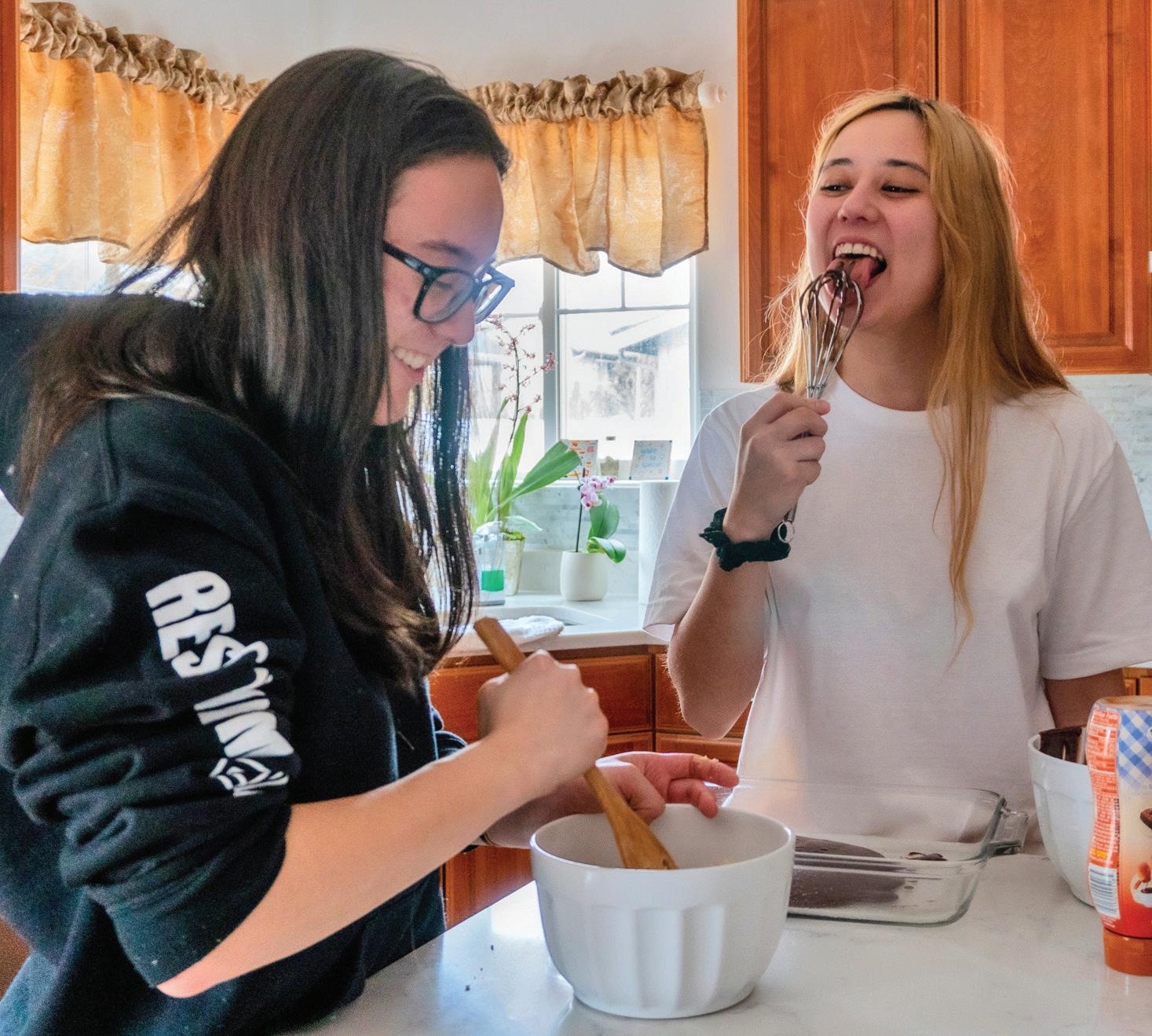
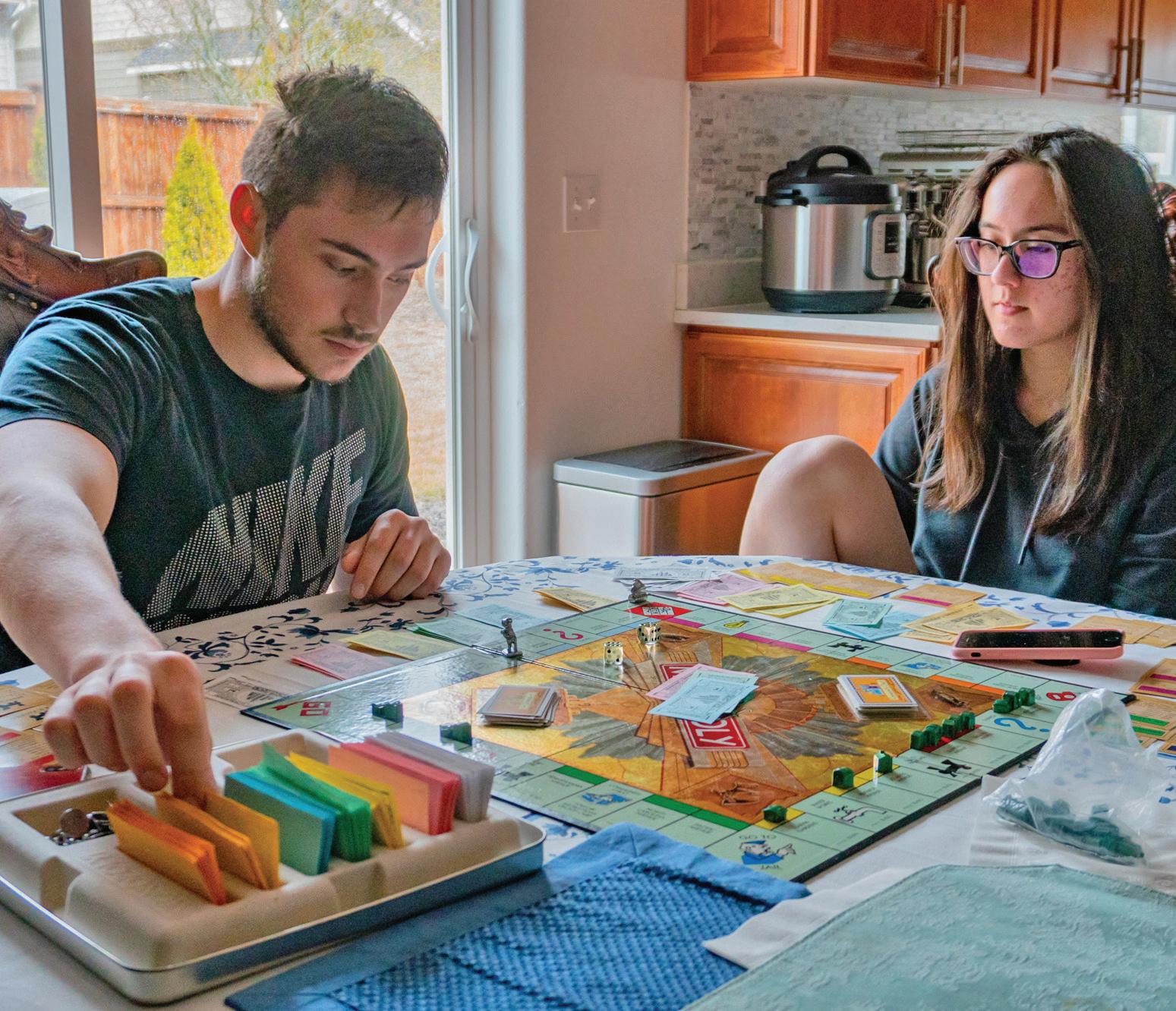
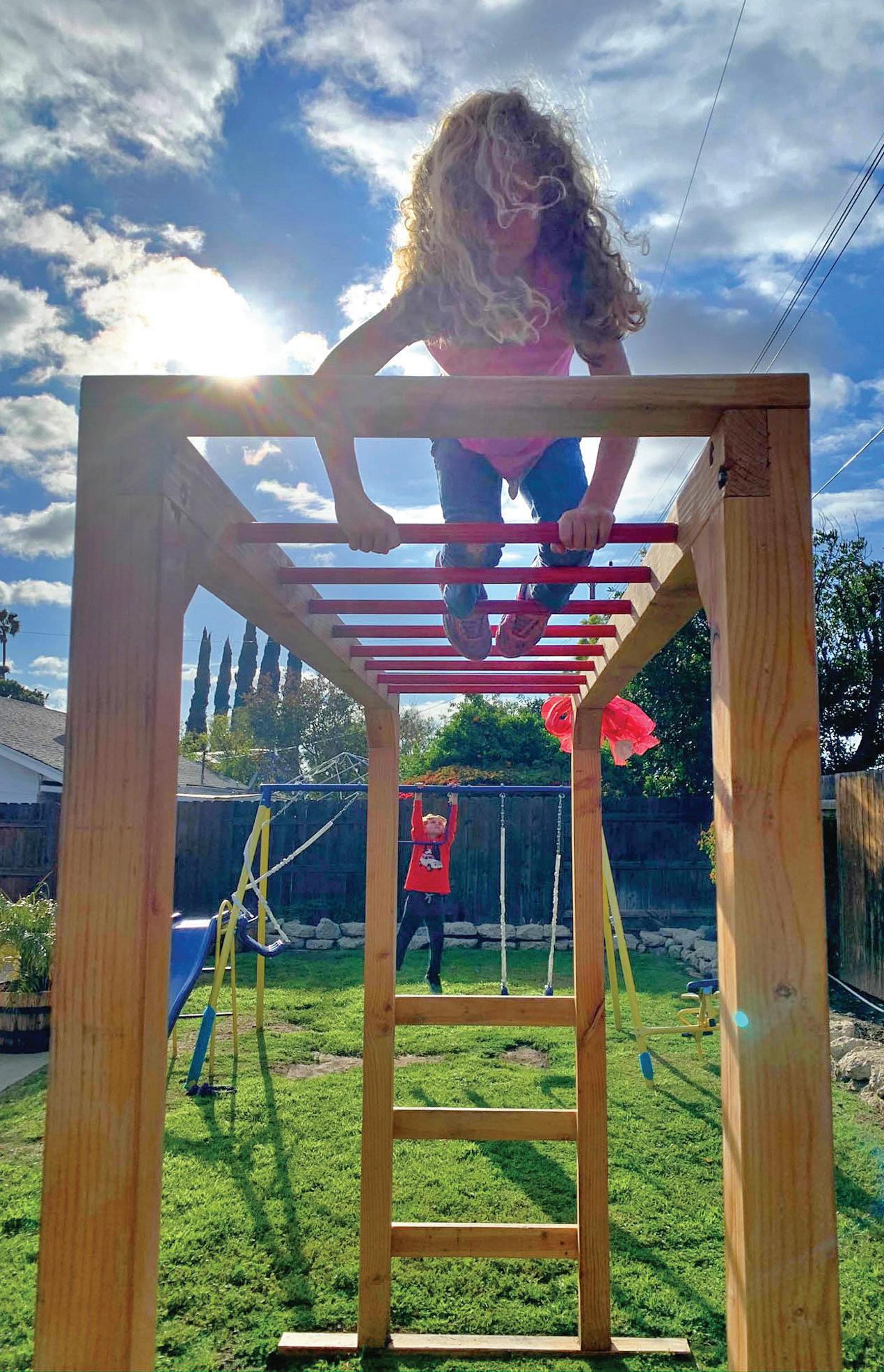
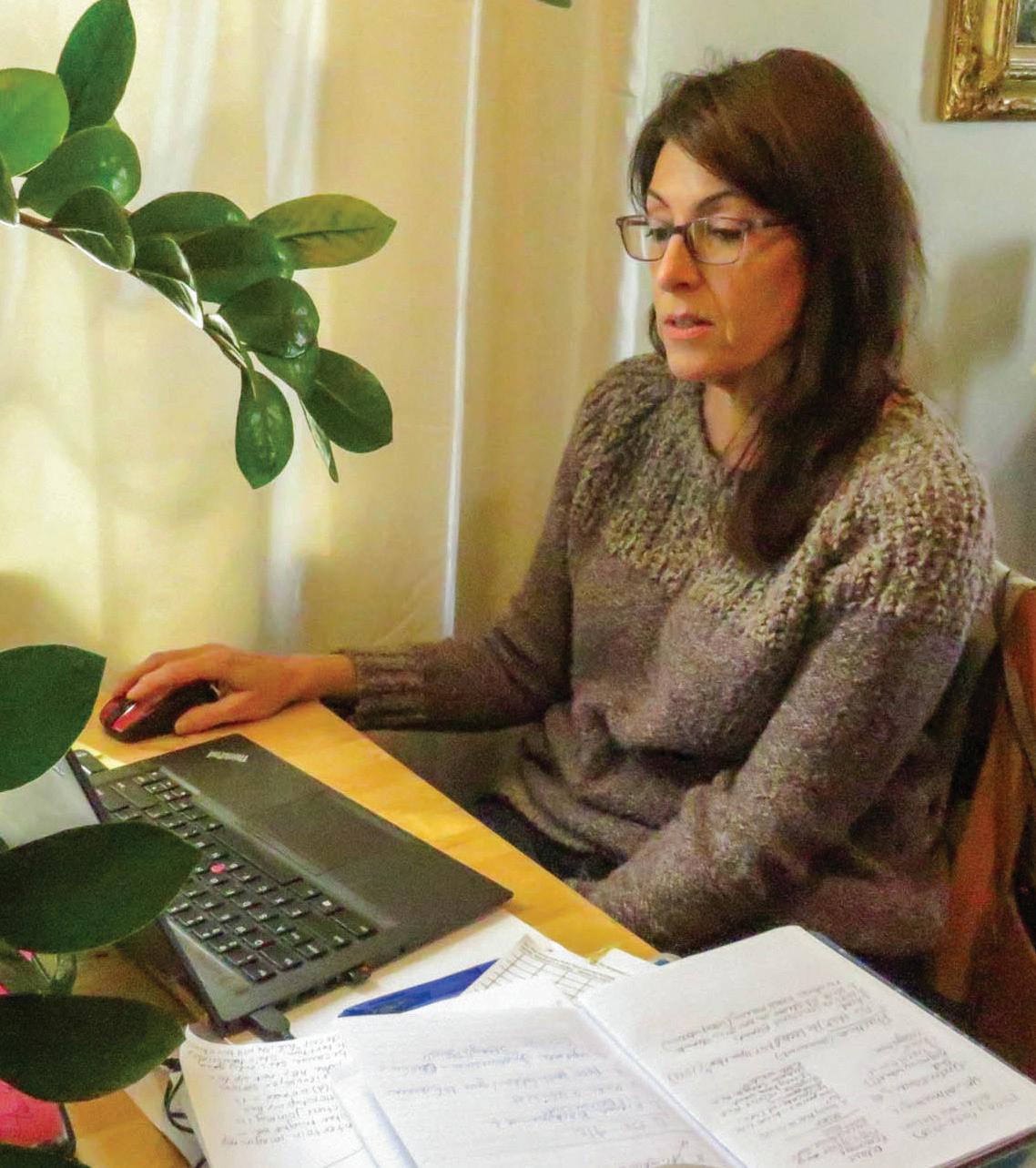
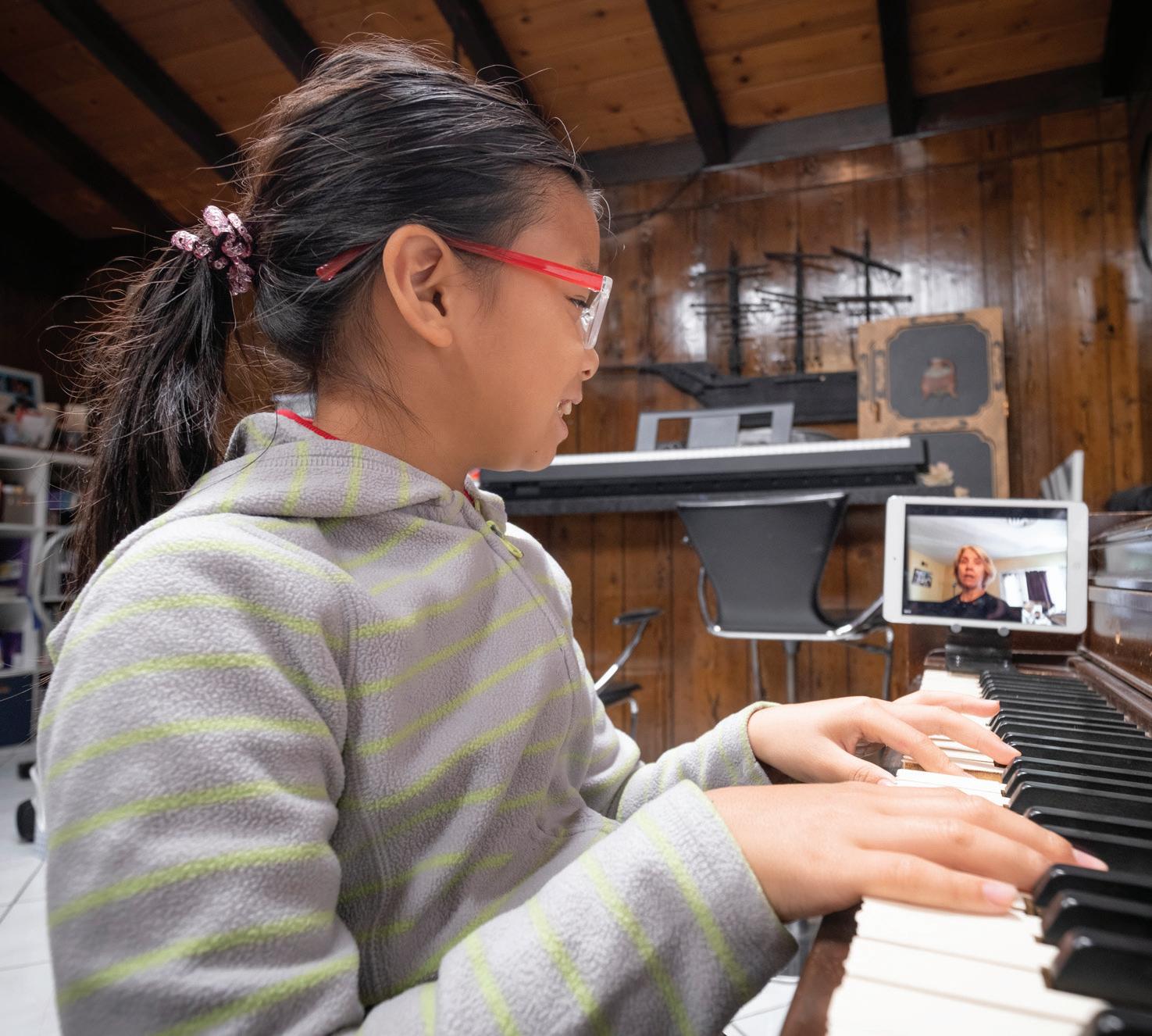

5 Photo Essay ROUNDUP: April 8, 2020
Jewell Balzomo, 8, takes her piano class with her instructor Beth Stern through a video call on April 1, 2020, at her home in Winnetka, Calif.,
Photo by Kevin Lendio.
Stephanie Purkey sleeping during the middle of the day during the Safer At Home ordinance in Redmond, Oregon, on April 1, 2020. Photo by Joshua Price.
The Purkey sisters, (left to right) Ashley and Stephanie, make the most out of the Safer At Home order by baking in Redmond, Oregon, on April 1, 2020. Photo by Joshua Price.
Andres and Adriana Samour play during COVID-19 quarantine at the garden in Simi Valley, Calif., on March 24, 2020. Photo by Jose Samour.
Derek Mann and Ashley Purkey play Monopoly to pass the time in Redmond, Oregon, on March 30, 2020.
Photo by Joshua Price.
First left photo: Yuri, a 6-yearold dog, takes a rest in the living room after his daily walk in Reseda, Calif., on April 2, 2020.
Yuri is a cross of both German shepherd and husky breeds. Photo by Nathan George.
Second left photo: Stephanie Purkey getting some fresh air in the hot tub in Redmond, Oregon, on April 1, 2020.
Photo by Joshua Price.
Shannon George, an English teacher at East Valley High School, prepares for an online Zoom meeting with her students at her home in Reseda, Calif., on April 2, 2020. Photo by Nathan George.
Classrooms and offices get sanitized to fight spread of COVID-19 Keeping campus clean Therapy on Zoom
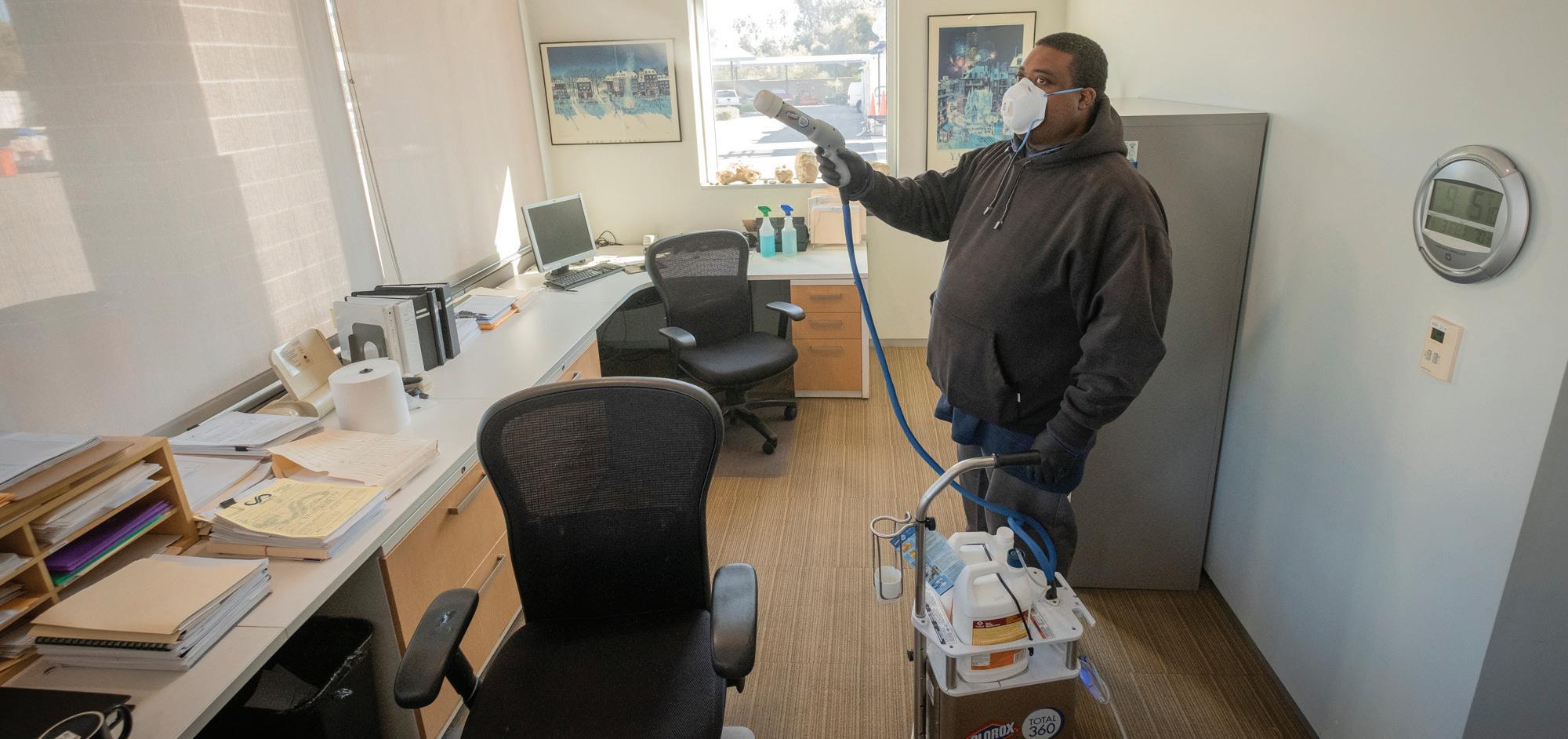 BY KEVIN LENDIO
BY KEVIN LENDIO
Director of facilities
Paul Neiman discussed on Friday how they continue to manage the campus while it is closed.

He said he’s been working on a staggering schedule with vice president of student services Rolf Schleicher to keep the whole week fully covered.
“We do this in order to keep things going,” Neiman said.
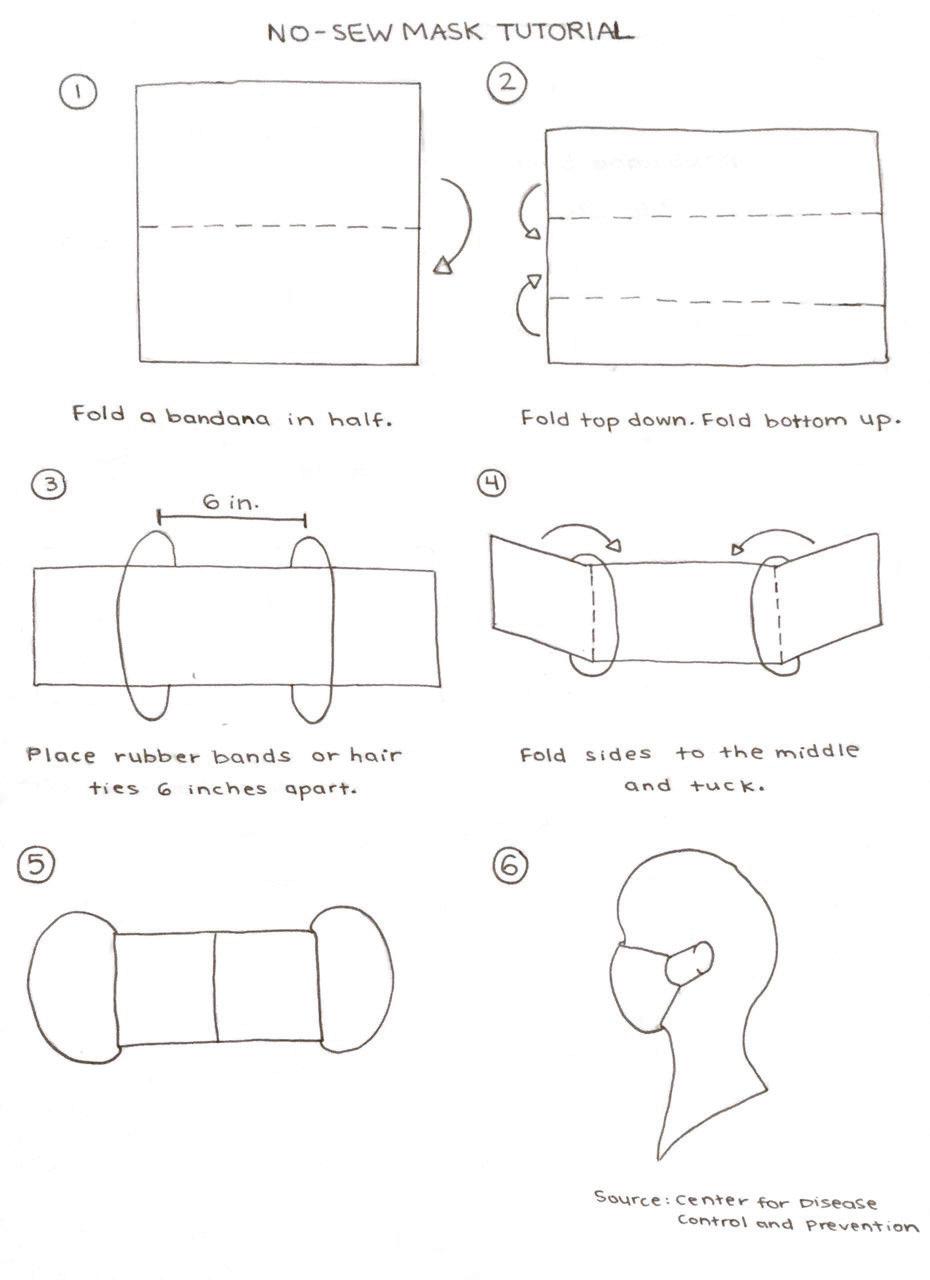
According to Neiman, their team is making sure to clean up and sanitize the premises so when school gets back in full operation, everything is still maintained.
“That’s my biggest worry,” he said. “Even gardening is out there cutting the weeds because Mother Nature takes over very
quickly. That’s the thing we need to stop.”
They use Clorox Total 360 disinfectant cleaner for the sanitizing process. They have a special machine that sprays the cleaner and covers surfaces without having to move things around. After a room is covered, they place a pink note that says “disinfected” at the opening of the door.
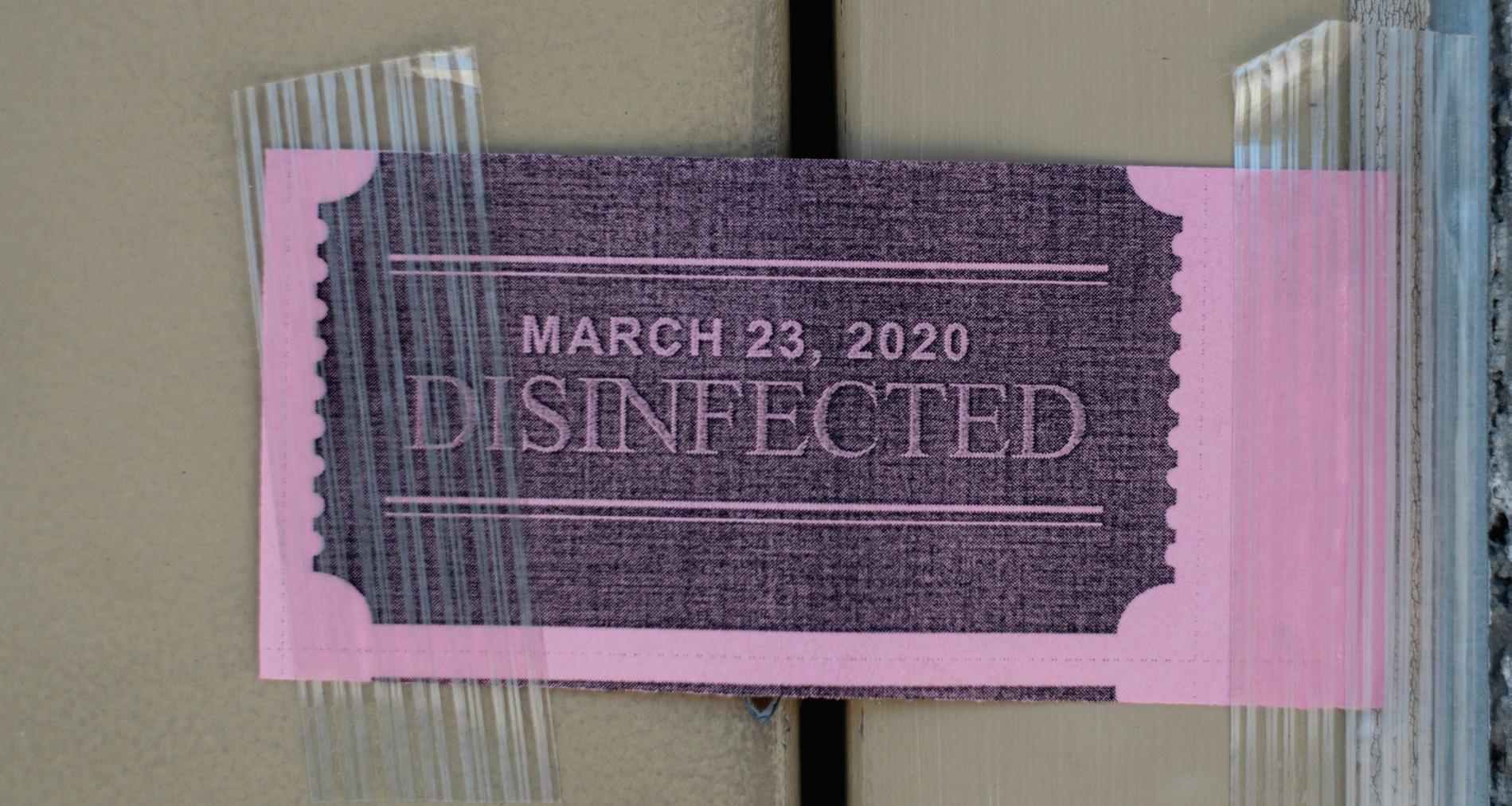
Another concern for him is the people who keep visiting the campus and break the seal they already placed.
Once people come in, they will be urged to do another 72-hour procedure to sanitize the area again. He said the whole department of facility is working really hard and has done a great job.
BY PETER VILLAFANE
Mental health counseling appointments have moved online to Zoom while the Student Health Center is closed, according to the center’s postdoctoral therapist Inbar Malevski.

Students who already have counseling appointments were sent emails with a Zoom link that included their appointment information, such as the date and scheduled time.
The meetings are confidential and the Zoom system is Health Insurance Portability and Accountability Act compliant, said Malevski in an email.

“It is important for us to continue providing our students with important services and are offering students the option of maintaining their counseling appointments remotely,” Malevski said.
Malevski said she is glad the Zoom appointments are available because the COVID-19 quarantine has put a strain on the mental health of some students.
“I’m very happy that we are able to offer to students especially in these times,” Malevski said. “It triggers a lot of anxiety for people.”
Malevski said the Zoom appointments provide a challenge to her regular workflow.
“You can’t see the whole body so you don’t get the energy in the room,” Malevski said. “So it’s a little bit harder, but still the video really helps.” The meetings will not be recorded for training purposes as they usually are. It has yet to be announced until when the appointments will be on Zoom.
L.A. Life 6
ROUNDUP: April 8, 2020
NEED A LITTLE BREAK? PLAY! EAT! UNWIND! IT’S ALL HERE FOR YOU… Winnetka Bowl & Entertainment Center Bowling … Billiards … Arcade Lane 33 Bar & Grill, Village Café, FRIDAY LIVE Music, Karaoke, Ladies Nite Mondays… Mention this AD for $1 off drinks Must be 21 with valid ID and School ID For Details 818.963.4311 or go online - winnetkabowl.net 20122 Vanowen St at Winnetka Ave. , Winnetka 91306 Kevin Lendio / Roundup Custodial staff Philip Shackelford sprays disinfectant Clorox 360 nside the Maintenance and Operations building at Pierce College in Woodland Hills, Calif., on April 2, 2020.
Ill Illustration by:
Katya Castillo / Roundup A “disinfected” sticker shows that the Village 8300 classroom has been fully sanitized and sealed at Pierce College in Woodland Hills, Calif., on March 23, 2020.
Peter Villafane
BRIEF: pvillafane.roundupnews@gmail.com klendio.roundupnews@gmail.com





 T
wo more months and the spring semester will be over. For students of Pierce College, these months are painful days of facing unprecedented challenges brought by the global disruption of COVID-19.
T
wo more months and the spring semester will be over. For students of Pierce College, these months are painful days of facing unprecedented challenges brought by the global disruption of COVID-19.
















 BY KEVIN LENDIO
BY KEVIN LENDIO





